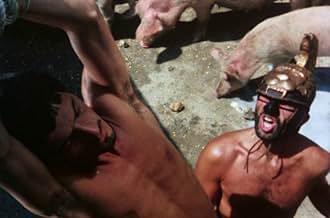Der christliche Glaube einer römischen Garde, der einem niedrigen Außenposten zugewiesen wurde, kollidiert mit dem Wunsch seines schwulen Kommandanten nach Nähe. Gequält zu werden wird zum V... Alles lesenDer christliche Glaube einer römischen Garde, der einem niedrigen Außenposten zugewiesen wurde, kollidiert mit dem Wunsch seines schwulen Kommandanten nach Nähe. Gequält zu werden wird zum Vergnügen.Der christliche Glaube einer römischen Garde, der einem niedrigen Außenposten zugewiesen wurde, kollidiert mit dem Wunsch seines schwulen Kommandanten nach Nähe. Gequält zu werden wird zum Vergnügen.
- Auszeichnungen
- 1 Nominierung insgesamt
- Sebastian
- (as Leonard Treviglio)
- Emperor's Guest
- (Nicht genannt)
- Emperor's Guest
- (Nicht genannt)
- Emperor's Guest
- (Nicht genannt)
- Emperor's Guest
- (Nicht genannt)
- Emperor's Guest
- (Nicht genannt)
- Emperor's Guest
- (Nicht genannt)
- Emperor's Guest
- (Nicht genannt)
Empfohlene Bewertungen
Sebastiane's "obsessive" Christian faith rivals the lustful obsession of Serverus for this unattainable man. The movie doesn't flinch from showing how brutal desire can be; it is a hard master for both Serverus and Sabastiane. What I came away from the film with is the powerful question: What horrors and debasements will we all put ourselves through for the object of our lust?
Consider the film's approach to homosexuality. No one is defined as being a homosexual, so that at first seems like a de-politicization of sex -- all there are are acts, and acts are not political. But at the same time, it's acts that are disdained and made illegal, and without the "political" approach to defining (and thereby defending) people as homosexuals, it leaves the acts open to censorship and condemnation -- politicization. As a film itself, though, it is not pedantic or accusatory -- in fact, Sebastian is killed, it seems, because of the lust of Severus, who he refuses. Like the Christian God who Sebastian loves and sees as more beautiful than Adonis, Severus wants Sebastian. But it isn't just condemning lust, either -- Anthony and Adrian are openly lovers, and the abundance of male nudity, and the eroticism of it by Jarman, could hardly be called prudish. In fact, there is a scene at night of the men grabbing each other, their dark-lit bodies, and the soldier pressing his near-naked, muscled body on his lover, that still seems shocking in its passion today.
It's more like a lyrical tone poem, and Brian Eno's New Age-y score goes well with that. Jarman isn't a bully, and when the crucifying comes around he doesn't bludgeon us -- first we see a close-up of his face, as arrows pierce through Sebastian's skin, silently with the exception of the wind, and Jarman gives us one final distorted image to meditate on the death of the one we can't have. 9/10
SEBASTIANE is not, then, a conventional film. It would be misleading to assess it in conventional terms. At times it is jokey, revelling in its low budget and independent spirit. At other times, it is so beautiful it takes your breath away. And at other times it seems to crawl along, with dull acting beneath a luxuriously blue Sardinian sky.
Leonardo Treviglio is a stunning, intense Sebastian, a Renaissance painting come to life. As his tormentor Severus, Barney James successfully conveys frustration and bewilderment behind his icy-grey eyes. Richard Warwick (probably the best known actor, having made a mark as one of the young rebels in Lindsay Anderson's IF...) is quietly impressive as Sebastian's only friend in the outpost. A lot is required of Neil Hamilton as the gruff Maximus, which is a pity because he is unconvincing enough to be a distraction.
Personally, I think SEBASTIANE succeeds as a cinematic study of the isolation at the centre of martyrdom. It doesn't indulge in psychological speculation. It simply depicts some of the temptations, struggles, and sufferings involved. The sensuality of the lives of the other soldiers is at odds with the kind of life Sebastian wants to live. Jarman and his co-director (and editor) Paul Humfress show all this with great clarity.
However, one of the side-effects of such clarity is emotional detachment. We watch as if the film were an installation in an art gallery. Nothing wrong with that, as long as you remember that's what you're looking at. Otherwise you might emerge from SEBASTIANE thinking that it's a failure, a halfway-house between an art-film and a porn-movie. For me, though, it's pretty successful on its own terms. And because it was a pioneering piece of film-making in other ways (Latin dialogue, gay lovemaking, self-conscious anachronisms), SEBASTIANE will always have a place in cinema history.
Wusstest du schon
- WissenswertesWhen asked about the film's nudity, director Derek Jarman replied "We couldn't afford costumes."
- PatzerThe soldiers play with a modern Frisbee in one scene. When one soldier catches it, the logo appears.
- Zitate
Sebastian: His eyes are so beautiful. He has sky-blue eyes.
Justin: What is this? What are you talking about?
Sebastian: His hair is like the sun's rays.
Justin: Sebastian...
Sebastian: His body is golden like molten gold. This hand of his... will smooth away these wounds. Justin, he is as beautiful as the sun. This sun which caresses me... is his burning desire. He is Phoebus Apollo. The sun... is his... burning kiss.
- Alternative VersionenWhen shown on British television in the 1980s, a shot of a naked man with the erection was cut out of the film.
- VerbindungenFeatured in Arena: Derek Jarman - A Portrait (1991)
Top-Auswahl
- How long is Sebastiane?Powered by Alexa
Details
Box Office
- Weltweiter Bruttoertrag
- 4.091 $
- Laufzeit1 Stunde 26 Minuten
- Sound-Mix
- Seitenverhältnis
- 1.37 : 1
Zu dieser Seite beitragen
























